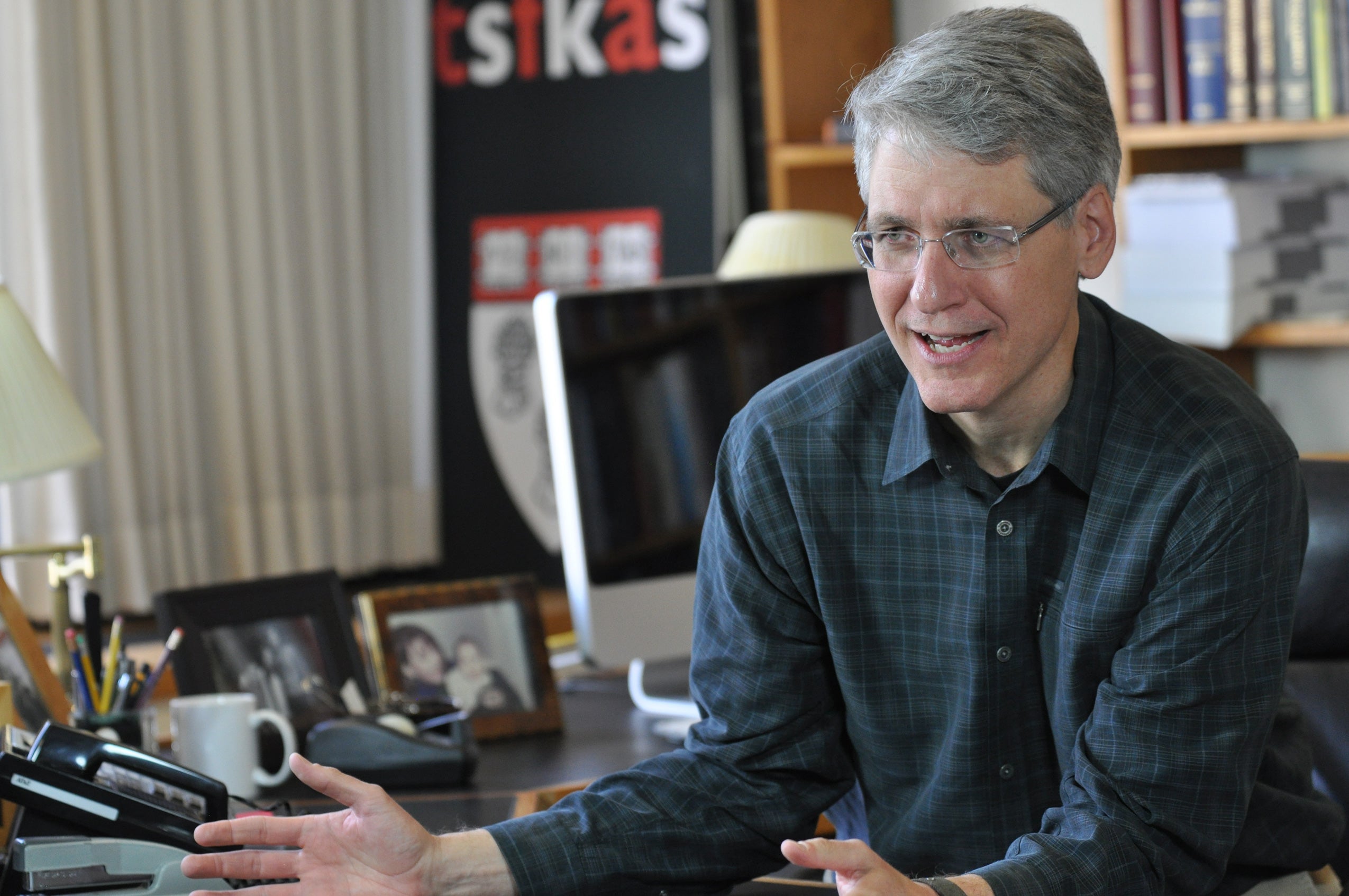Professor Jon Hanson, the Alfred Smart Professor of Law, is this year’s winner of the prestigious Albert M. Sacks-Paul A. Freund Award for Teaching Excellence, an honor bestowed each spring by the Harvard Law School graduating class. The award recognizes teaching ability, attentiveness to student concerns and general contributions to student life at the law school.
This is the second time Hanson has received the recognition. He won the Sacks-Freund award in 1999, and he was a finalist in 2000 and again in 2006.
Class Marshall Sameer Singh Birring ’11 introduced Hanson at Class Day exercises on May 25. He called Hanson a pioneer in the movement to apply insights from psychology to the analysis of law and policy. A student in Hanson’s Corporations class this spring, Birring said he found Hanson’s teaching to be transformative. “Jon Hanson impacted my thinking more than any other professor at Harvard, and his class changed my life,” he said. “Learning about psychological phenomena and how they affect our choices, our thinking and our policy gave me an entirely new perspective with which to view the law and the greater world around us.”
In his remarks, Hanson talked about his own journey to Harvard Law School. “I wasn’t actually supposed to become a Harvard Law School professor. Just ask anyone who knew me before I was one.”
He and his wife, Kathleen, married as teenagers and expected to work in the restaurant business. Neither saw the point of a college education, he said, but their trajectory changed and both attended community college, Rice University and later Yale. Hanson said he shared his personal story in part to convey why this award means so much to him. He recalled his own feelings upon his graduation from Yale Law, and the future he imagined for himself post high school compared to what lay before him upon graduation from law school. “If my life and work as a scholar and teacher is worth any recognition at this point it is largely because of the fact that, at that moment when poised in that transitional space between a world class legal education and the world itself, I took a deep breath, Kathleen and I together took a deep breath. In that moment it dawned on us that the greatest value of the achievement was that we had been lifted to a place where we could do something bigger with our lives.”
Hanson urged students to use the power of their education to consider the state of the world and problems related to, among other things, the environment, racial and gender inequality, inequality of wealth and opportunity, and institutional corruption. “The law is part of those problems and will have to be part of the solutions,” he said. “No matter what your story is today, no matter what got you to this point, you are now graduates of Harvard Law School: brilliant, talented, aware, young, potent and poised for greatness. This world needs you.”
A specialist in corporate law, law and mind sciences, situationism and torts /product liability law, Hanson has taught corporations, torts, and Law and Mind Sciences, a seminar that examines the relevance of social psychology, social cognition, cognitive neuroscience, moral psychology, political psychology, and related fields for law and legal theory.
He is the director and co-creator of the Project on Law and Mind Sciences at Harvard Law School, a research program founded six years ago to promote interdisciplinary exchange and collaboration between the mind sciences and the legal community. In February, PLMS hosted its fifth annual conference, “The Psychology of Inequality.”
Hanson’s scholarship, which melds social psychology (and related fields), economics, and law, includes the following: The Blame Frame: Justifying (Racial) Oppression in America, 41 Harvard Civil Rights-Civil Liberties law Review 413 (2006) (with Kathleen Hanson); The Illusion of Law: The Legitimating Schemas of Modern Policy and Corporate Law, 103 University of Michigan Law Review 1 (2004) (with Ron Chen); and The Situation: An Introduction to the Situational Character, Critical Realism, Power Economics, & Deep Capture, 152 University of Pennsylvania Law Review 129 (2003) (with David Yosifon).
Hanson joined the Harvard Law faculty in 1992 and received tenure in 1997. In 2007, he was named the Alfred Smart Professor of Law, a chair endowed by the Smart Family Foundation, in honor of Alfred Smart, a 20th-century publishing entrepreneur who helped launch Esquire magazine and other publications.
Established in 1992, the Sacks-Freund award is named in honor of the late Harvard Law School Professors Albert Sacks and Paul Freund. Recent award winners have included Michael Klarman, Elizabeth Warren, Robert Bordone, Richard Fallon, Martha Minow, William Stuntz, Laurence Tribe and Lani Guinier.
